Peter MALONE
Saturday, 18 September 2021 19:22
Duet for One
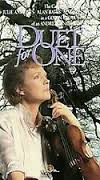
DUET FOR ONE
UK, 1987, 107 minutes, Colour.
Julie Andrews, Alan Bates, Max Von Sydow, Rupert Everett, Liam Neeson,
Directed by Andrei Konchalovski.
Duet For One is based on the play by Tom Kempinski, who collaborated in the adaptation of his play for the screen, along with director Andrei Konchalovski (Maria's Lovers, Runaway Train, Shy People).
The film seems somewhat stagebound at times, a presentation of characters in a rather histrionic style. Julie Andrews portrays a celebrated violinist (based on Jacqueline Du Pre) who suffers from multiple sclerosis. Alan Bates is her conductor husband (based on director Daniel Barenboim). Max von Sydow is her psychiatrist.
The story of Jacqueline Du Pre was told in the 1998, Hilary and Jackie with Emily Watson as the cellist.
The film shows the complicated reaction of the celebrated artist - a mixture of love and hate, self-pity and self-assertion, suicidal tendencies along with a desire to live. Julie Andrews is interesting in this role. The other characters tend to be stereotypes of their roles: Bates as the wandering husband, von Sydow as the sympathetic but Scandinavian-style gloomy psychiatrist.
There is a great deal of classical music and violin-playing throughout the film. (There are supporting roles by Rupert Everett and Liam Neeson who were emerging as starts at this period.)
1. Interesting drama? The arts? The artist? Illness and debilitation?
2. English location: the credits with the introduction to London? London atmosphere? The English countryside? The musical score, the classical pieces?
3. The title and its focus? Music? Skill in playing? Creativity in playing? Illness and handicap?
4. The portrait of Stephanie Anderson and Julie Andrews' style? Her visit to the psychiatrist, her self-assertiveness, abrasiveness? The fact of the multiple sclerosis and her fears? Her relationship with her husband, the marriage, the creativity, each in their own career? Her skill as a pianist? The flashbacks and her concerts? Her teaching, especially Constantine? Her playing for friends and her fingers not functioning? The build-up to the performances? The collapse and her having to leave the stage? The effect on her life, on her attitudes? People being friendly and supportive? Her husband and his concern? Her psychiatrist and her avoiding the visits, her finally returning, her attacking him? His skills in letting her talk? His own sadness and her response to this? Her pianist and his death - and his ghostly reappearances, helping her to look at the humorous side of herself, helping her in her difficulties? In her will to live? The separation from her husband, her urging him to go on his tour, her realising his relationship with Penny? Her aggravation towards Penny? Her relationship with Harry, the sexual liaison, going to the club, meeting his wife, sharing with him, the gift of the violin and his selling it? The plan for the recordings, her self-pity, Sonia and her arrival, cancellation of the recordings? The maid and her devotion, the slapping of her face, the voices in the night, her fears, apology? Her attempted suicide and being saved? The old musician and his urging her to live? Her recovery? The passing of the year, friendship with the psychiatrist, the return of David and Penny, Penny's pregnancy? The party in her honour, her looking from the outside, an acceptance of her life?
5. The focus on multiple sclerosis, the physical effect, the paralysing of the pianist's fingers? Her having to go into a wheelchair? Unable to stand, dropping things? The psychological effect - for a human being, being demoralised, thoughts of death, thoughts of suicide? Sense of helplessness - and the scene where David chases the wheelchair? Readjustment to life, to career? Self-assertion and the possibility of coping, work, relationships?
6. The portrait of David, his work in composition, the marriage, conducting? His love for his wife, support at the concert, her collapse? His relationship with Penny? Separation, going on tour, trying to phone his wife? The final separation, Penny's pregnancy? Penny and her work, devotion to David?
6. The portrait of the psychiatrist, his concern, his accepting Stephanie's attacks? Asking her questions? Her abusing him? His confession of inadequacy, concern about his health, asking doctors' opinions? Her change of attitude, compassion for him? Their friendship?
7. Constantine as the star student, his skill in performance, playing with Stephanie? Aware of the mistakes? At the concert? His decision to leave, being in need of money, defying her? His return and her pride in him?
8. Harry, his daughter, collecting the goods? Spurning of Stephanie? The job, taking the goods, his apology? The sexual relationship (and Stephanie discussing this with the psychiatrist)? His singing in the club, the performance, his wife and her tolerance? The gift of the violin and his selling it?
9. Sonia, her support of Stephanie, the agent? Urging her to answer her husband? The cancellation of the concerts?
10. The maid, her devotion, being abused and slapped, the apology?
11. The old musician, his playing, his death? His joke about his hand on his head and stomach? His appearances to Stephanie - especially during her suicide attempt?
12. How well did the film hang together? The various elements? Persuasive for the audience? Helping the audience to understand the characters, especially Stephanie?
Published in Movie Reviews
Published in
Movie Reviews
Tagged under
Saturday, 18 September 2021 19:22
Dry White Season, A
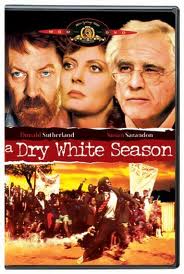
A DRY WHITE SEASON
US, 1989, 107 minutes, Colour.
Donald Sutherland, Zakes Mokae, Janet Suzmann, Susan Sarandon, Marlon Brando, Jurgen Prochnow.
Directed by Euzhan Palcy.
A Dry White Season is a most moving film, based on the novel by South African author Andre Brink. The screenplay was written by Colin Welland (Chariots of Fire, Twice in a Lifetime) and reworked by the director Euzhan Palcy (the young Martinique director of Sugar Cane Alley).
The film has an international cast, designed for making its impact on the wide audience outside South Africa. It is an attempt, especially by the black director, to create characters who are credible, both black and white, but will make the appreciation of the abuses of apartheid clear to the predominantly white audience.
Donald Sutherland gives a very moving performance as the schoolteacher who comes to an awareness of the oppression of apartheid in South Africa. Janet Suzmann is his uncomprehending wife. Jurgen Prochnow is the cruel head of the Special Branch. Susan Sarandon is a journalist and there is an impressive guest role by a huge Marlon Brando as an English lawyer.
The cast also includes many South African actors, especially Zakes Mokae, and in guest roles, British actors like Michael Gambon and Ronald Pickup.
Filmed in Zimbabwe, set in 1976, the film focuses on the response of one family to apartheid and oppression - and makes its point tragically.
1. The impact of the film? On world audiences? South Africa and its issues? Apartheid and race?
2. For whom was the film made? The stars and the perspective of the plot? The perspective of the director? The combined effect?
3. The viewpoint of the story? Black point of view, white point of view? The emphases in the dialogue? The final violence and the killing of the director of the special branch? (The whites contributing what they could, the blacks taking action.) The final statistics about torture and disappearances?
4. The title and its ironies? 1976? The whites in South Africa before '76, after?
5. The credits and the two boys playing, the subsequent history of each boy? The symbolism of each boy? Jonathan, his arrest, his death? The white boy and his living, changing perspective?
6. Jonathan, the arrests, playing, the caning and its effect? The protest by the schoolchildren? Their plan, the march, singing? Smoke bombs, the shooting? The number of children shot? The riots, chases and death? The little girl being killed, Jonathan helping, his arrest and disappearance?
7. The portrait of Gordon and Emily? Their concern, their children? Gordon as the gardener, his discussions with his children and their future, going to school? Emily and her strength? Going to Ben, the explanations, the easy relationship, master and servant? Getting the information from McKenzie? Ben thinking that something must have merited the punishment, and that nothing could be done? Jonathan's death, no body and information? Gordon and his desire for justice, getting the affidavits, the interviews? The night arrest, the taking of the documents? The brutality of the torture? His death? His body laid out, the violence of its wounds? Emily and her decision to fight, getting the group together, Stanley and his co-ordination? Ben and his presence? Emily in court, the losing of the case? Embracing Ben? The eviction from her home? The children taken in the night, into the truck? Her being beaten, her death? Gordon and Emily as the symbols of the oppression of apartheid?
8. Stanley, his mysterious presence, taxi-driver, attitudes? Friendship with Gordon, at school with Emily? The confrontation with Ben, taking him to view Gordon's body? The contacts? Susan's reaction to him? The gathering of the affidavits, the discussions with Ben - and nicknaming him Lannie (Honky)? Drunk at Christmas, the final plan, Melanie and the documents? His finally shooting the head of special branch? His motivation - approved of or not? Violence or not?
9. Donald Sutherland's portrayal of Ben: with his family, the football, playing with his boy, with his grandson, his daughter and her husband, Susan? His age, going along with the regime, presumptions? A decent man? Friendship with Gordon? His work at school, teaching Dutch History? The dinners? The family discussions? Benign? The information, trying to help, contact with McKenzie?, the news of Jonathan's death? The friendships on the staff and in the staff room? His son and the sport, his carving? His pride in his family? His decision to go to see Gordon's corpse, the effect? The dangers and hiding in the taxi? His refusal to be interviewed by Melanie? Going to the colonel, being reassured? The autograph for Stolz? Their warnings to him? His decision to go to court, the interview with Mc Kenzie and the argument? The presentation of the case, his being aghast at the evidence, the case being lost? His embracing Emily, the photos in the paper? His being snubbed in the staff room, his eventually being sacked, his being asked to remove his son from the school? The collection of the documents, the range of interviews with the schoolgirl, the officer, the hospital personnel? The secret hideout? The search for the documents? Susan and her giving the information? The arguments within the family, Stolz and his search of the house? Susan and her reaction, her decision to leave? His daughter and her concern about her husband's future? The warnings by Stolz? Melanie and the plan, Zimbabwe? His son and the documents, the explosion in the home, the shots in the night? His daughter as decoy, the pain with the betrayal of his daughter? His pride in his son? Getting the material to the papers? His meditating, his violent death? A symbol of a South African coming to awareness - memories of his childhood and growing up, talking with Stanley, and yet his power position? The change? A decent man? Audiences identifying with him?
10. Susan as a typical South African: ordinary, her presuppositions, appearances, white domination, the past, the winning of the land, every inch? The meals and the discussions? Love for her family, the horror of what was happening, not being able to stay with Ben? The search of the house, the brutality on her boy? Siding with her daughter and her husband? Their bigotry, mockery, violence? The betrayal by the daughter, Stolz thanking her?
11. The son, young boy, ordinary, at school, sport? His siding with his father, the interrogation and the boy's brutality? The outings with his father, love for his mother? Shrewd about his sister's observations, hiding the documents? His riding the bike and delivering them to the papers? The future generation and his consciousness?
12. Stolz, his brutality, the beatings, the torture? The African witness seeing him - and later being shot after giving testimony? Wanting Ben's autograph? In the court, his smugness, his presuppositions? The search of the house, his comment on Ben's taste, the warnings? Suzette, getting the documents, his smouldering anger, his brutality in killing Ben, driving back over him? The final expose? Stanley killing him?
13. The presentation of the South African authorities: the magistrate and his bigotry, his findings on the case? The prosecutor? The colonel and his warnings? The military, both black and white? The torture teams?
14. McKenzie? and Marlon Brando's presence: size and accent, his realism and the justice in South Africa, changing the laws? His ideals, arguing the situation with Ben? Taking the case, his cross-examinations, his witty making of points, incisive questions, presenting the photos of torture? His losing the case - and his desperate cynicism about South African law?
15. The people in the court, the dentist and his answering according to plan, Ben's later visit to him and his resisting the truth? The imprisoned doctor and his house being bugged, giving testimony? The tortured black prisoner and his fearlessness against Stolz? His disappearance and death?
16. Apartheid, the dramatisation of Soweto? The poor housing, conditions? The contrast with the whites, their homes? The black servants - and the whites talking about them as they served? The court and its segregation? A just portrait of apartheid at work in South Africa?
17. The film's stand against apartheid, ideas, practice, injustice? The emotional argument for a world-wide audience?
Published in Movie Reviews
Published in
Movie Reviews
Tagged under
Saturday, 18 September 2021 19:22
Drowning By Numbers
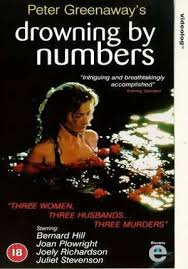
DROWNING BY NUMBERS
UK, 1988, 119 minutes, Colour.
Joan Plowright, Joely Richardson, Juliet Stevenson, Bernard Hill.
Directed by Peter Greenaway.
Drowning by Numbers is described by its writer-director Peter Greenaway as a sardonic morality play - a poetic, amoral tale told morally to support the belief that the good are seldom rewarded and the bad go largely unpunished.
This film fits into Greenaway's canon between The Belly of an Architect and The Cook, the Thief, His Wife and Her Lover. Once again it is a sardonic, pessimistic look at human nature, relationships, battles between men and women, the mysteries of death. Also, Greenaway the artist, architect and painter creates visual jokes and codes (here, the sequences being numbered 1 to 100 and the numbers appearing in each sequence). There are also multiples of three - with the three Cissies, three murders, three proposals, three seductions...
The cast is impressive with Bernard Hill as the corrupt magistrate, Joan Plowright with Juliet Stevenson (Truly Madly Deeply) as her daughter and Joely Richardson (Vanessa Redgrave's daughter) as her daughter. There is a supporting cast of English character actors.
The film plays with the audience, tantalising it visually and aurally, creates a puzzle as regards relationships and deaths, but also tantalises ethically, checking whether the audience agrees or disagrees with the amoral stances of the central characters.
As with the title, there are symbols of water and death throughout the whole film. The musical score comes from Greenaway's regular musician, Michael Nyman. The photography is by his regular director of photography, Sascha Vierny.
1. Peter Greenaway's films - their popularity, subject of critique? The intellectual content? Visual content? Interconnections? Codes, symbols, semiotics? The background of architecture and painting? Cinema poetry of an intellectual type?
2. Greenaway and cinema as poetry and as essay? The themes of life and death, sex, fidelity and betrayal, the law, the battle between men and women (relationships, emotions, physical)? The subplot of circumcision and its sadistic tones? The playing of games, rules and codes, winners and losers? The significance of numbers? Counting, mathematics? Biology and science? Evidence and knowledge? And the symbols of land and water?
3. The significance of the number 3? The three Cissies and their family relationship? Influence on one and the other, mother-daughter relationships? Influence in terms of education, guidance for life, advice for murdering? The three Cissies as the three Furies? Fate? The focus on the females, femmes fatale, their treatment of men, children? Their wisdom, foolishness?
4. The title, the drownings? The games played by the characters, especially Madgett?
5. The prologue: the little girl, her dress, her mother, counting the stars, 100 stars, skipping? The introduction to Cissy 1? Smut and his talking with her, the question of circumcision? The police, the risk - and her death? The sudden irony of her death? Her rope killing Smut? The themes of innocence and innocence lost?
6. The joke, apples, sex - Nancy? The romp, the baths, Cissy, watching, the story? Cissy 2 as 34? The drowning, its effect? Cissy 2 with Nancy in the barrow? Going to bed?
7. Cissy 1 and her age of 60? Husbands, fidelity, burning the fork, the blame? The discussion with Cissy 2 about Hardy? Fat, Nancy? The relationship between Cissy 1 and Cissy 2. Cissy 3 and the continuance of the generations? These three women as real? As symbols?
8. The character of Madgett, his place in the town? Eating, sick? The coroner? His love for games? Smut and his interactions with Madgett? The numbering? The hangman's cricket game and its mysteries? The deaths, the coroner's judgments? The funeral, blackmail? His being rejected by Cissy 1? Cissy 2 and her reaction? The burial? Cissy 3 and his advances? Failure? The truth, his trying to take advantage of people? Smut and his work? The initiation of the tug-of-war, its result? Smut abandoning the tug-of-war? The sense of fatality? Going to the boat, stripping - did he die or not?
9. Smut and the key? Wake, games, Samson, counting, the tags? The deaths? The days and the colours, the fireworks, the photos, cricket and death, the animals? Discussion with the little girl about circumcision? His cutting? The death of the skipping girl, the police, the funerals, his abandoning the tug-of-war, the rope and the irony of the game and his death?
10. Cissy 2 and Hardy, the wedding, eating, the cramps? Typing? The sexual relationship, the drowning and the calling of the joggers to witness? Grief or not? Fate?
11. Cissy 3 and sexuality, the wedding, the advances? The plumber? Not swimming? Training and dying? The conspiracy between the three women?
12. The rituals of the coroner? The women as widows? The celebrations of the funerals? Ashes?
13. The conspiracy group, the influence on the other people in the town, collaborating with the women? The meetings at the funeral, under the water tower, the sides in the tug-of-war?
14. The ethical and moral issues? Moral foundation and stances? Amoral?
15. The importance of the visuals and the camera compositions? Animals and insects, food, destruction and decay? The rooms - and the influence of the architect? The symbol of water? The editing, compositions and the atmosphere of Michael Nyman's music?
Published in Movie Reviews
Published in
Movie Reviews
Tagged under
Saturday, 18 September 2021 19:22
Do the Right Thing
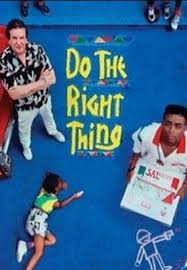
DO THE RIGHT THING
US, 1989, 120 minutes, Colour.
Danny Aiello, Ossie Davis, Ruby Dee, Richard Edson, John Savage, Giancarlo Esposito, Spike Lee, John Turturro, Bill Nunn, Rosie Perez.
Directed by Spike Lee.
Do The Right Thing was produced, directed and written by Spike Lee, who also stars. He made his first impact with She's Gotta Have It and then with School Daze. Lee is a passionate writer and director, focusing on the situation of black Americans.
This is the story of one hot summer day in the Bedford Stuyvesant area of Brooklyn (Lee's own home). It is a story about ordinary people, detailing very effectively the small things that happen on the street and in the neighbourhood during that day. However, the underlying theme of racism is very strong - and eventually it erupts into a violent riot with death and the intervention of the police.
Danny Aiello is very good as Sal, the owner of the pizzeria, the focus of the film. A lot of character actors participate, especially Ossie Davis and Ruby Dee.
The film captures the atmosphere of daily New York life, the range of characters, many incidental but giving an authentic atmosphere to the film. It was well received at the Cannes Film Festival, and on release in the United States there was apprehension that it could lead to riots in the cinemas. It didn't - however, it gave rise to a great deal of discussion about the issues. His 1991 Jungle Fever took his themes into affluent black Harlem.
1. The impact of the film? As comedy drama? Race issues? The United States, New York? Controversy?
2. The importance of the authentic locations, the Bedford Stuyvesant streets, the pizzeria, the apartments, the detail of street life? Editing and pace?
3. The musical score, the songs, rap style, aggressive lyrics, racial themes? Fight the power?
4. The photo of Martin Luther King with Malcolm X? The significance of their being together? The final two quotations: the non-violence of King, the explanation of Malcolm X of reaction which is not violence? The controversy and ambiguity of these themes in the film?
5. The title, as spoken by Da-Mayor? Mookie listening to it? For whom was the message of the title?
6. The structure of the film: one day, the very hot summer and its aftermath? Symbolic day, symbolic cross-section of people, symbolic conflict? The nature of the resolution?
7. The opening with the radio announcer, in the window, observing the street, playing the music, making the comments?
8. Mookie and his sister? The focus on Mookie, Spike Lee himself playing the role? Type, going to work, his size, dress, manner of speaking, going to Sal's? Working with the Italian pizza parlour?
9. The portrait of Sal: 25 years in the neighbourhood, his grown sons, his authority over them, ordering them about? The race themes? One son wanting to move out, the other not? Their bigotry? The interplay of the three men? The details of the work of the day?
10. Sal in himself, his attitudes, towards the blacks as customers and friends, benign? The pictures of Italian American celebrities on the wall? The reaction to the suggestion about pictures of black people? Radio and noise, his baseball bat, threatening, eventually bashing the radio? The tension, the heat, his feeling tired? The passing day, the various groups, his friendliness? The man who wanted to boycott - and the discussions? Pino becoming more virulent? The build-up to the end of the day, closing, staying open? His achievement up to that point?
11. Mookie and his moods, pro and con, his relationship to Sal, to Pino, the other brother? Around the parlour, his work, the deliveries and the heat and tiredness, his meeting the people in the street, giving some money to Smiley? Going home for the shower? The delivery to his wife, the discovery about his son, antagonism of his mother-in-law? Returning for the money? The brawl, the boycotters, watching at the start of the riot?
12. Da-Mayor? as the old man with experience, waking up, doing the job sweeping, the money and buying a beer, his attraction towards Mother-Sister? Wandering the streets, his injunction to Mookie of `Do the right thing'? Observing, buying the flowers for Mother-Sister?, saving the boy from being run over? His response to the riot?
15. Mother-Sister? and her watching, her sadness, relationship with people, getting her hair done? The flowers from Da Mayor, praising him for saving the boy, her sadness and cry at the end?
16. Smiley, his stammer, his pictures of Martin Luther King and Malcolm X, his annoying people, friendliness, Mookie buying some, Sal giving him the money, his observing people, being told to go away? The riot?
17. The three men in the shade, their talk, the jokes, watching, criticisms? Symbolic attitudes?
18. The big man with the radio, his walk, having pizza, buying the 20 batteries, his loud radio and his standover tactics, his radio being bashed - and the repercussions?
19. The Koreans across the street, their shop, not understanding English too well, the 20 batteries, the observers, the outsiders, the attitude of the blacks towards them, extending the hand of friendship?
20. The man who was upset about the pizza and the photos on the wall, rabble-rousing, clashes with Mookie, talk of the boycott, the suggestions - and its growing during the day, to the man whose radio was bashed? The consequences with the riot?
21. Jade and Sal, their friendship, arguments at home, home for the shower? Her visit to the pizzeria, Sal's attentions and kindness, Mookie's resentment and warning Sal? Mookie's wife, child? Going home, the sexual encounter, the ice?
22. Incidents in the street, the child and his almost being run over, the mother criticising him and criticising those who criticised her? The man with the ices? The various groups?
23. Clifton as one of the few white people on the street, presence, questions? The white police, on their rounds, buying some pizza, their return during the riot?
24. Enjoyment on the street, recreation, action? Ordinary detail? Colourful language? Swearing?
25. The attempt at the boycott, the group in the shop, Sal keeping it open for them as a favour? The resentment of the sons? The fight, the radio man, the noise, the police arriving, holding back the radio man, killing him? Mookie and his anger and breaking the window? The crowd going berserk?
26. The fire, the riot, the violence, the complete destruction? The effect on Sal, sitting in the ruins? His sons? The others?
27. The racist attitudes in the blacks, antagonism towards the whites, not having the power to be as angry as whites? Sal and his angers but his kindness? Violence erupting? Pino and his bigotry and the strong dialogue he was given?
28. The aftermath, Sal and the 25 years, building it himself, Mookie coming for the pay, their argument about the money? Sal's future? His sons? Mookie going back to his wife and child?
29. Race themes, universal themes? Bitterness, violence, eruption, the conditions for violence? The possibilities for change? Resolution?
Concerts, performances, controversies? New Hagen,
Published in Movie Reviews
Published in
Movie Reviews
Tagged under
Saturday, 18 September 2021 19:22
Doors, The
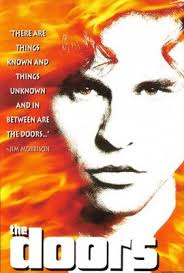
THE DOORS
US, 1991, 134 minutes, Colour.
Val Kilmer, Meg Ryan, Kathleen Quinlan, Frank Whaley, Kevin Dillon, Kyle Mac Lachlan, Billy Idol, Michael Madsen, Michael Wincott.
Directed by Oliver Stone.
The Doors was co-written and directed by Oliver Stone.
Stone, noted for his hard-hitting and gutsy films, wants to interpret Jim Morrison and the Doors in their time, the ethos of the 60's, Morrison's death and the mystique that followed his death.
Stone wrote strong screenplays for such films as Midnight Express, The Year of the Dragon. He directed Salvador, won an Oscar for Platoon, directed Wall Street, Talk Radio and won another Oscar for Born on the Fourth of July. He was also nominated for his interpretation of the Kennedy assassination and the conspiracy theories, JFK.
The film recreates the period of the 60's (as well as memories of Morrison's childhood in New Mexico in the 40's). The film focuses on Los Angeles, the Clubs, the atmosphere of freedom, sexual experimentation, drug-taking. Morrison, with the mystical sense of himself, especially in association with native Indian mysticism, succumbs to the world of freedom, moves to New York and moves in the hedonistic Andy Warhol world, breaks with his band though reconciles with them, moves to Paris where he dies at the age of 27, dead in his bath from an apparent heart-attack.
Val Kilmer is energetic as Morrison. Meg Ryan is the woman in his life and Kathleen Quinlan has an unsympathetic part as the woman who seduces him and leads him into the area of black magic. A strong caste represent the members of the Dawes band.
The film was long, incorporates the music and lyrics of Morrison, presents him in his context - his fans well appreciate this, others will be bewildered as to where Stone stands on this whirlwind life. (The Eddie and the Cruiser films were based on something of the mystique of Morrison.)
1. The reputation of Jim Morrison and The Doors? The music, the period? His life and his death and its aftermath?
2. The work of Oliver Stone, writing, direction? Vivid style? The biopic, the portrait, the interpretation? The social impact of Jim Morrison? Music? Bands?
3. The visuals, the editing, the pace? The recreation of a psychedelic period?
4. The film is a piece of Americana, the ethos of the 60's moving into the 70's? A re-interpretation and judgment on the period? Paris in the early 70's?
5. Morrison's music, its style, the tradition, the lyrics, the members of the band.
6. The biographies of Morrison, the perspectives? Technical advice from John Densmore and members of the Doors?
7. The framework of the film, Morrison and his recordings,
the quote from America, Prayer?
8. The reputation of Morrison, his names: The Capital Lizard King, the Demon Prince, the Poet, Rock Artist, presented as a kind of contemporary Dionysus?
9. The significance of the flashbacks, Morrison's childhood, New Mexico, family - and his later denial of them, the Indian mystical sequences and his belief in this?
10. Morrison as a young man, studying, musician? Meeting with Pamela, the attraction, moving in with her? The friendship with Ray, poetry? Meeting with John Densmore, Rob Krieger, their playing together, forming the group?
The Doors and their performances? A career and possibilities?
11. Gradual changes with Morrison? The Los Angeles Clubs, the performance of the music, the response of the audiences, the effect on him, growing more frenetic, sexual behaviour, controversy?
12. The further changes with Paul Rothschild as agent? The visit to San Francisco, the hippie atmosphere, Morrison at home here, his behaviour? The reaction on the Ed Sullivan show? Moving to New York, the heady pace, Andy Warhol and his influence, Andy Warhol’s friends, New York society? Morrison caught up in this world, succumbing to it? Pamela with him? The reaction of the group? The Press reaction and criticism?
13. The meeting with Patricia Kennealy, attraction, age difference, the sexual encounters, her fascination with Black Magic, religion? Her behaviour, drawing Morrison into this?
14. The concerts, performances, controversies? New Haven, backstage, the encounter with Patricia? The lies about his parents? The atmosphere of the concert, performance, sexual behaviour, the police?
15. The Thanksgiving Celebration, his relationship with Pamela, with Patricia? His urging Patricia to kill him? His personal deterioration, his mind? Drink, drugs?
16. Business deals, the collapse of the group, the antagonisms?
17. Miami, the Concert, indecent behaviour, the police, Patricia and her claims of pregnancy, his motivation for a suicide's spree on the roof? His personal collapse?
18. The break-up of the group? The film's portrait of Pamela, love for Morrison, her being hurt? The members of the group, their own lives, support of Morrison, clashes? The reconciliation?
19. Themes of death, a death-wish? Linked with the Indian mysticism? Death stalking him? His going to Paris, lifestyle? His death?
20. Morrison's gifts, talent, contribution? The music as performed through the film? The conflicts in his life? Born in the 40's, raised in the 50's, a product of the 60's, dead in the 70's? The mystique of his music and personality and its influence?
Published in Movie Reviews
Published in
Movie Reviews
Tagged under
Saturday, 18 September 2021 19:22
Dogfight
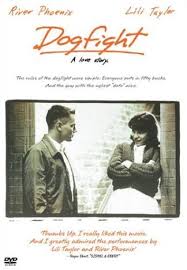
DOGFIGHT
US, 1991, 92 minutes, Colour.
Lili Taylor, River Phoenix, Richard Panebianco, Brendan Fraser.
Directed by Nancy Savoca.
Dogfight is a surprisingly effective short film, mainly a two-hander between Lili Taylor and River Phoenix.
The film was directed by Nancy Savoca who made an impact with her initial film about Italian marriages in the Bronx, True Love. (Both films are striking in their characterisations but are marked by copious rough language.)
River Phoenix is effective as the young man, going to Vietnam, caught up in the ethos of the military forces and making a bet with his buddies about dating the ugliest girl, the dog. Lily Taylor is a shop assistant whom he meets, decides that he will use her for the winning of the bet - but gradually comes to appreciate her as a person, is humiliated by his treatment of her, and then returns for a reconciliation.
The film indicates that River Phoenix would have had a long career had he not died, a versatile actor. Lily Taylor has appeared effectively in Mystic Pizza, Robert Altman's Short Cuts and, especially, Abel Ferrara's The Addiction.
1. A brief and small-budget film? Portrait of two characters and their interactions?
2. The San Francisco settings, the streets, the dance-hall, the cafe? The contrast with Vietnam and the war? Musical score?
3. The title, the focus on the males betting, the focus on the plain women? Indication of themes? Tone?
4. The November 1963 setting? The month of the Kennedy assassination? The end of Camelot? The end of a seeming innocence and idealism? The beginning of the American involvement in Vietnam? From advisers and peacekeepers to full-scale war? The '90s perspective on the '60s and Vietnam?
5. The quick portrait of Eddie and the fellow marines? The bonds between them, the line, on the bus, the plan for the dog competition? Typical of the rough young men of the period? The fodder for Vietnam 1963? How well did the film highlight the differing personalities, their interactions, their stances?
6. The portrait of the girls (from the perspective of a woman director): Ruth, the girl with glasses, Marcia and her teeth? Their situations, the flattery of the men, their believing them? Their own neediness and the response? The men talking up the girls? The ugliness of the competition, the dancing, the judges? The humiliation of the girls? Their not deserving it?
7. Themes of sexism, the macho attitudes of the young men, the victimising of the women, rudeness, crassness and exploiting them?
8. The portrait of Rose, in the shop, playing the guitar, talking to Eddie? Her mother? Eddie and his visit, the decision about Rose, his motives? Rose's talk, the excitement of going out, getting ready? Her mother's reaction? Eddie talking her into coming out? Going to the dance, the talk, the drinking, the being sick, the talk with Marcia and her realisation of what was happening? Her being hurt and humiliated?
9. The character of Eddie, the ordinary young man - but with a difference? Attitude towards the dogfight, towards Rose? The talk, the dancing, the competition?
10. Rose and her anger, her discussions with Eddie? The possibility of him seeing a different perspective? The change, the clash? His wanting to make up to her? Her accepting his invitation to go to the dinner? The swanky hotel and the issue about the jacket? The meal, Eddie's boorish behaviour, the swearing? Rose and her reactions, wanting a more sensitive approach? Her criticisms of him?
11. The night together, what it meant to each of them, the change in attitudes of each, the farewell?
12. The bus, Eddie and his lies, the truth? Vietnam, action, the young men joking, the attack, the injuries?
13. Eddie's return, talking in the bar, looking in the shop, approaching Rose, their embrace? A future?
14. A film about ordinary people, stances of the sexes, sensitivity and crassness, the possibilities of genuine love?
Published in Movie Reviews
Published in
Movie Reviews
Tagged under
Saturday, 18 September 2021 19:22
Doctor, The
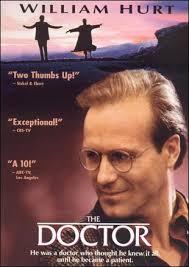
THE DOCTOR
US, 1991, 123 minutes, Colour.
William Hurt, Christine Lahti, Elizabeth Perkins, Mandy Patinkin, Adam Arkin.
Directed by Randa Haines.
The Doctor is one of a series of films of the early '90s focusing on professional people, finding that they have lived empty lives, wanting to make something new of their life. Other films include Harrison Ford in Regarding Henry, Jeff Bridges and Robin Williams in The Fisher King, Patrick Swayze in City of Joy.
The film was directed by Randa Haines, who directed its star William Hurt in Children of a Lesser God. The screenplay was written by Australian Robert Caswell, based on the book A Taste of My Own Medicine by Ed Rosenbaum. Caswell was the screenwriter of Evil Angels, Over the Hill. The director of photography was Australian John Seale.
The film has a strong supporting cast led by Christine Lahti as Hurt's wife and Elizabeth Perkins as a terminally ill patient. Mandy Patinkin is a colleague who is under threat for legal malpractice.
While the film has a great number of elements from popular films and television series about doctors, the strength of the direction and the acting makes it more memorable than many other films.
1. The tradition of cinema and television programs about doctors and hospitals? Doctors, their expertise, treatment of patients? Hospital staff? Reaction of patients? The changes in doctors' lives? Audience expectations and predictability?
2. The popularity of the theme in the early '90s of professional people coming into crisis and changing their lives, a focus on a more humane life?
3. The title, the focus on the doctor as a character, as a professional?
4. The colour photography, the blue and grey tone of the film with its emphasis on life in the hospital? The hospital itself, corridors, wards, surgery? Homes? The interlude in the Nevada Desert? The musical score? The songs sung by the doctors? The songs from the past and their relationship to particular characters?
5. The credits: the surgery, the songs, the jokes and wisecracks, the attitudes of the surgeons, the patient, professionals at work, smug and impersonal aspects? The black assistant refusing to join in? The buddy system in the surgery? Expectations of doctors?
6. William Hurt as Jack McKee: his skills, professional style, treatment of patients? The initial surgery? His friendship with Murray? The rounds with the interns, his comment on cutting straighter and caring less? His reputation with the staff? The disturbance in his throat, his difficulties in talking? His patronising attitude towards Eli? Driving his car, the clash with Anne in the other car? The drive home? His relationship with his son - the phone and the boy thinking his father was on the phone rather than present in reality? Relationship with his son? Love for his wife but keeping her at a distance?
7. Jack and his work, the rounds, the visits to patients and their various reactions, the tough doctor? His own illness and having to see Dr Abbott? Her treatment of him? Impersonal? The biopsies and the tests? Anne going with him to the hospital, trying to support him? The sequences at home, in the bedroom? His inability to feel support? The hospital, the filling in the forms, his assertiveness? The information from Dr Abbott? The treatment, the delay, no single room? The encounter with Harry the cop and their discussion about doctors? His being given the enema by mistake and the administration reactions?
8. The diagnosis of his illness, opinions, radiation therapy? The effect on him, no better? Anne trying to support him?
9. The meeting with June, their relating well, talking? Her own condition, the lies told, the information about her chances of recovery, money needed for operations? June and her health, going up and down? Her spirit of fight? The roof as her special place? Urging Jack to fight against the system? Her longing to see the dancers, Jack taking her into the desert, her weariness? Their dancing by the lake, her sense of freedom? The return home, Anne and the phone call? His visiting June, her death? The delay in reading her letter? Her death and Jack telling Anne? Going up on the roof to read her letter?
10. The change to Jack, his inability to operate? The legal questions, Murray and the evidence? His seeing the injured man in the garage? Personal integrity and his decision not to back Murray? Murray as a character, surgeon, ethical questions, the files? His callous way of speaking? His career being destroyed? Friendship?
11. The clash with Dr Abbott, being late, her impersonal touch, the fight and her throwing the file?
12. Eli, the sympathetic surgeon, Jack and his visit to him, making the request, the successful surgery?
13. Jack improving in his treatment of people, the personal touch, people's names? His operation, the assistant joining him in singing in the surgery? His attitude towards the interns - dressing them in hospital garb, making them have tests for three days for empathy with the patients?
14. His own experience of surgery, Anne and his pushing her away? The bonds, his return home? Anne's anger, his having no voice? Getting the board, urging her by his writing: Shout at me, I need you? Her angry reactions? The possibilities of reconciliation?
15. Themes of reappraisal of life?
Published in Movie Reviews
Published in
Movie Reviews
Tagged under
Saturday, 18 September 2021 19:22
Distinguished Gentleman, The
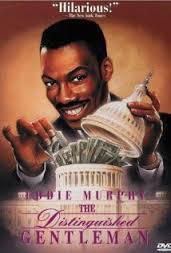
THE DISTINGUISHED GENTLEMAN
US, 1992, 112 minutes, Colour.
Eddie Murphy, Lane Smith, Sheryl Lee Ralph, Joe Don Baker, Kevin Mc Carthy.
Directed by Jonathan Lynn.
The Distinguished Gentleman is an enjoyable Eddie Murphy vehicle, a change of pace from the action films like 48 Hours and Another 48 Hours and the films designed for black audiences, Harlem Nights and Boomerang.
The film was written by Marty Kaplan, former speechwriter for American politicians. It was directed by Jonathan Lynn, the writer-director of Yes, Minister as well as such films as Nuns on the Run and My Cousin Vinnie. This is broad humour - designed for the widest audience and bringing people back to Eddie Murphy as an entertainer.
There is strong support from Lane Smith as Dick Dodge (Lane Smith has portrayed Richard Nixon, Tricky Dicky, in telemovies) with veterans like Joe Don Baker and Kevin McCarthy? as well as TV star Grant Shaud (Murphy Brown) in a supporting role. James Garner appears very briefly as the incumbent congressman who dies. There is a focus on racial issues - however, the issues in Washington relate more to environmental questions?
1. Popularity of Eddie Murphy? Reaching a popular audience at the beginning of the '90s?
2. The echoes of the films of Frank Capra and the optimistic picture of individuals changing corrupt politics? The background of the screenwriter and his writing for politicians, the director and his work on Yes, Minister and Yes, Prime Minister?
3. The Florida settings, wealthy environment, the poorer homes? Washington DC, Capitol Hill? Musical score, songs?
4. The title and its ironies about the American Congress? Audience expectations?
5. Eddie Murphy and his style, visual humour, verbal, timing? Pleasant - conman? His crew, their cons and scams? The fundraiser, his performance, the blackmail, Zeke Bridges and his vulnerability? The $12,000, the Rolex? The persuasive patter? The escape - and his overhearing the money deals about politics?
6. Jefferson at home, family, the significance of his name? His style, the group, the cons? Miss Loretta and the pornographic phone service? The advertisements?
7. The congressman and his style, wealth? His relationships, his death? The irony of his wife and her wealth, her antagonism? Zeke Bridges and the Florida wealthy backers of congressmen, the group, their interests, anti-environmental?
8. The political campaign, the humour, Jefferson's anonymity, the slogans, the election, the role of the media?
9. Going to Washington with his entourage, their style, arrival, the rooms and offices? Miss Loretta and the handling of the office? His assistance? The visits from the politicians, the deals? Dick Dodge and his patronage? Arthur Reinhart and his liaison work? Money, double-dealing, benefits?
10. Jefferson's encounter with Celia, her principles, concerns? Attracted and her reaction? Elijah Hawkins and his campaigns, style, truth? The ethical clash with Dodge? Celia and her support of her uncle?
11. Jefferson and his being more involved with social issues, the mother and the cancer-ridden child, the hat coming off in the struggle? The pathos and the appeal? The electricity substations and the consequences? Celia and her concerns? Dodge, the deals, the money? Hawkins being hurt, Celia's reaction? Jefferson bought off?
12. His change of heart, the decision to trick Dodge? The elaborate meetings, the political double-talk? The pressure for the inquiry? The video threat? Dodge and his reaction, the expose, the timing for the playing of the video and the discrediting of Dodge? His friends? Zeke Bridges, Terry Corrigan, Olaf Andersen?
13. Dodge and his cronies? Arthur Reinhart and his double-dealing?
14. The finale, the change of heart, the romantic ending? The humorous ironies - and the only place to go is to become president?
Published in Movie Reviews
Published in
Movie Reviews
Tagged under
Saturday, 18 September 2021 19:22
Diggstown
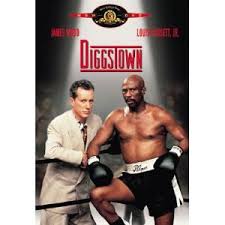
DIGGSTOWN
US, 1992, 98 minutes, Colour.
James Woods, Bruce Dern, Louis Gossett Jr, Oliver Platt, Heather Graham.
Directed by Michael Ritchie.
Diggstown (Midnight Sting) is the town where the action takes place. This is a sting movie with James Woods the fast-talking conman in charge, Bruce Dern the corrupt owner of the town, the target, and Louis Gossett Jnr the retired professional boxer who is called on to do all the boxing bouts for the sting. The film was well written and acted, but with the focus on boxing and ten KOs, those who do not like the sport would be advised not to watch. Director is Michael Ritchie, who has made a wide range of films over several decades including Prime Cut, The Candidate, Downhill Racer as well as the Fletch films and the Bad News Bears.
1. A piece of Americana, the focus on boxing, a sting comedy?
2. The prison, Diggstown, the hall for the boxing bouts, the choreography of the boxing? Musical score and songs?
3. James Woods as Gabriel Caine, in prison, the bouts, the information about Diggstown, arranging escapes for the prisoners? The clashes with the authorities and their resentment? His covering his tracks? The conman, his release?
4. The plan for Diggstown, setting up the bout between Wolf and Torres? Fitz as his accomplice, his acting abilities? Going to Diggstown, the bars, the talk, the setting up of the sting? The encounters with Gillon and his son? The meeting with Corsini and the putting up of the money? The setting up of the sting?
5. Palmer, his past, clashes with Gabriel? His wife and her reluctance to welcome Gabriel? Caine's visit, tempting Palmer, the argument, his deciding to go, the training for the bouts?
6. Fitz and his relationship with Gabriel, his con-artist style, playing snooker, leading on the men of the town, the bets?
7. Emily, Wolf's sister, her understanding of the truth, work at the bank, supplying information to Caine?
8. Setting up the bouts, leading Gillon on to bet more? The bribes to Palmer's opponents?
9. Gillon and his place in the town, his nervous energy, control, violence? Friends, the authorities of the town? The story about Diggs and his being drugged, Gillon betting against him? Setting up the ten bouts, his pressure on the opponents, especially Hambone and the threat to hang his brother? The hanging?
10. The fights and the choreography, the range of opponents, the crowd, the bets? Gillon and his watching? Caine's moods changing? Palmer and the fights, desperation? The humorous fights, the serious fights? Hammerhead Hagan and his dominance? Beating Palmer in the past? Palmer watching Diggs sitting in the gallery?
11. The Diggs story, the past, the injuries and his being a vegetable? The pathos of his watching Palmer?
12. The finale, the introduction of Torres? The prison authorities and unmasking Gabriel? The victory?
13. Gillon's son, his arrogance, the betting of the car - and the reaction of his father? Clashes between father and son?
14. The ending, Gillon defeated, Hambone hitting him, financial ruin? The end of the sting and justice being seen to be done?
Published in Movie Reviews
Published in
Movie Reviews
Tagged under
Saturday, 18 September 2021 19:22
Die Hard With a Vengeance
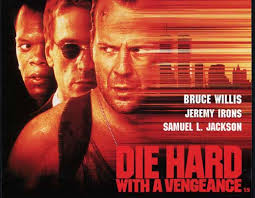
DIE HARD WITH A VENGEANCE
US, 1995, 128 minutes, Colour.
Bruce Willis, Jeremy Irons, Samuel L. Jackson, Graham Greene, Colleen Camp.
Directed by John Mc Tiernan.
Die Hard with a Vengeance - you know what you are going to get. This time it is more - and louder. Terrorism is rampant. The parallels with bombings in the United States in the mid-'90s is very clear. There are also enemies from Iran and the Middle East, terrorists from the police from former Eastern European countries, especially East Germany. The special effects are everything. But, by this stage, Bruce Willis has become such a well-known hero that the film relies on this laconic (except for the incessant swearing) style. He is much more credible at this than Sylvester Stallone or Arnold Schwarzenegger. Jeremy Irons relishes his villainous role. Samuel L. Jackson appears as Willis's unwilling partner, a kind of Defiant Ones for the '90s.
1. Audience expectations of the series? The success of the first two films? The third film with its characters, action, repeat of the basic overview of the earlier films? Expectations of actions, chases, violence and effects? Die Hard into the '90s?
2. The use of New York settings, the wide-ranging use of the city itself: Harlem, Central Park, the streets, the rivers, Wall Street, the buildings? The range of special effects and stunts? The musical score - and `When Johnny Comes Marching Home'?
3. The title? The red herrings? John Mc Clane and Bruce Willis's embodying him? The continuity of the three films and the Mc Clane character?
4. The opening, New York City, the streets, the subway, the trains, the explosion and its disruption? The response of the police? The villain and his playing Simple Simon? His wanting to confront McClane?
5. Bruce Willis and his style as John McClane? Audience memories of his background, his marriage - and now, the break-up? His being on a binge? Going to his job, offhand behaviour, smart cracks? The reaction of the other police, pro and con? His being involved in the case? His reaction to the Simple Simon game? His going to Harlem, with the placard and the word `niggers'? The phone calls? His encounter with Carver and Carver saving him from the angry crowd? In the shop, Carver becoming involved? Simon and the communication of instructions, giving the seemingly impossible deadlines? Driving through the park? The explosions? Running, the elephant? Finding the information in the park? The set up?
6. The screenplay and the development of the clues, the background to the robbery, the realisation of the robbery? The Reserve Bank? Simon and his group, their ruthlessness, the killings? Carver and his becoming involved with McClane?, sharing the anxiety, the chase, the tunnel, the drives? The various chases - in cars, water, Carver and the shooting, the final boat, the leap from the bridge, Simon and the bomb? McClane? and his final escape? Plausibility/implausibility? And the final decision to phone his wife?
7. The character of Carver, Samuel L. Jackson and his style? A kind of variation on The Defiant Ones as black and white are bonded together in danger? His shop, work, attitudes? The boys and the robbery? His attitudes towards racism and his antagonism towards McClane? The placard, saving him, the phone calls, the rude comments, his involvement? His abilities - and enjoying the action?
8. Jeremy Irons as Simon? His English style, the East German background? The revelation that he was the brother of the initial film's villain - and the glimpse of Alan Rickman falling to his death? His manner, dress, treatment of his group? The verses, playing games, antagonism towards McClane? The timing, the explosion in the subway, the bomb on the train? His sending McClane? on wild goose chases? The plan for the robbery, strategies, tactics? The trucks, the taking of the gold? The murders? The escape, the chase, the personal confrontation? His relationship with the girl? On the boat, caught, motivation?
9. The villains of the '90s? Iran and the Middle Eastern connections with terrorism? The recruiting of East German and Eastern European ex-military and ex-spies?
10. The picture of the police characters, their styles, the search? The build-up to the bomb in the school? The evacuating of the school? The various agencies?
11. Simon's Squad, their appearance, manner, cruelty? The woman and her sadistic approach?
12. The school - bringing a touch more of the human element into the slam-bang action?
13. The build-up to the climax, the chase, the tunnel, the water, the boat, the bridge, the action on the boat? The two action heroes saving the day?
14. Treatment and tone? The depiction of violence, language? The crass touches? The action touches for the '90s action audience? A warning about the potential of terrorism?
Published in Movie Reviews
Published in
Movie Reviews
Tagged under